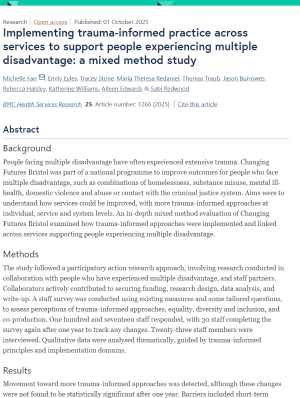Evaluating a trauma-informed programme to support people facing multiple disadvantage
7 October 2025
Cross-sector collaboration and long-term stable funding are key to making services more trauma-informed for people facing multiple disadvantage, according to a new study. The evaluation was conducted by ARC West staff in collaboration with Changing Futures Bristol and funded by the NIHR Three Research Schools Mental Health Practice Evaluation Scheme.
Published in BMC Health Services Research, the evaluation looked at UK Government-funded Changing Futures Bristol. This programme aims to improve support for people experiencing multiple disadvantage including homelessness, poor mental health, substance use, domestic abuse and contact with the criminal justice system.
Researchers worked alongside people with lived experience and staff to explore how services could better respond to trauma.
They surveyed 117 staff members, carried out interviews with staff and lived experience representatives who were involved in the programme, and attended various meetings and analysed documents to gain an in-depth understanding of the programme.
The team found some movement towards more trauma-informed practice, but the changes were not statistically significant after a year.
Enablers to this were support and resources for cross sector-collaboration, open decision-making, transparent management styles, opportunities to share learning, training and reflective practice for all staff including managers. Barriers included short-term funding, insecure contracts, and pressures on staff.
Many staff had their own experiences of trauma, and this often motivated people to do their best for clients. Working with clients who are experiencing high levels of trauma can be stressful, especially where there are gaps in service provision (e.g. lack of mental health support). Managers also faced a tough balancing act between meeting financial and performance targets and creating space for supportive, relational approaches. So, it is important that the right support is provided for all staff.
The article concludes that long-term funding, cross-sector collaboration and strong leadership are needed at every level, from local managers to central government. These are the key ingredients to embed trauma-informed practice and create a more stable, motivated workforce.
Dr Michelle Farr, Senior Research Fellow at NIHR ARC West, said:
“Staff working within the area of multiple disadvantage are intrinsically motivated to provide the best support they can for people who have experienced the harshest inequalities in life. Yet they are often working with short term funding, and in areas where there is a lack of public service provision. The government needs to have a long-term cross-departmental strategy with appropriate funding to truly change the lives of people who experience multiple disadvantage.”
Kath Williams, Director at Changing Futures Bristol, said:
“We are proud to contribute to this important work in demystifying what trauma-informed practice truly looks like in action. This research offers grounded insights into the enablers, barriers, and real-world impacts of trauma-informed approaches across services.”
Rebecca Halsley, from Independent Futures, said:
“I loved being part of the team writing this academic paper. I was able to get involved because of the trauma informed approach that underpinned every step. I am extremely proud to be a co-author.”
Paper
